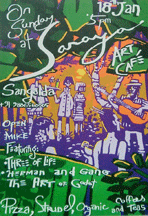Saraswatis Children Book Review
by Mohan Prabhu Ottawa Canada
The Konkani-speaking Christians of Mangalore form a small but, for its size, a remarkably prominent community among the people of India.
Among them are to be found eminent personalities from all walks of public life. Deriving from their efforts, there exist today pioneering contributions in education, health care, coffee plantations, and the tile industry. All the more remarkable is their achievement when viewed in the context of their exile from their homeland and near extinction as a separate community barely 200 years ago. Today's community owes its existence largely to those few fortunate survivors.
Sourcing information from over a hundred books and articles, this book discusses the origins and evolution of the community over three distinct eras in their long history. The first part covers the pre-Christian period, while the second discusses their Christianisation in Goa with the coming of the Portuguese. The final section covers their emigration to Mangalore and other part of Kanara, the growth of the fledgling community and the brutal episode known as the Captivity. The book contains 4 maps relevant to the subject.
A chapter-wise outline of the book follows: -
Part One: The Aryan Inheritance (5 chapters)
Part Two: The Lusitanian Legacy (7 chapters)
Part Three: Mangalore (8 chapters)
A Foreword to the book by Dr Michael Lobo, Ph.D.
Sarasvati's Children is not just a scholarly work aimed at historians and research students. It is a very readable book written for a much wider audience and should be much appreciated by any educated peson with an interest in the past.
It tells a story - an epic story - the story of group of nomadic people in search of a permanent home. originating, so far as is known,from the banks of the legendary Sarasvati River, some members of this group moved south towards the Konkan coast and Goa, others moved south-east towards Bengal. Linguistic research provides ample evidence of the common origin of the two groups.
It is the former group who is the ancestors of our modern Mangalorean Catholic community. They represent a fusion of two important historical and cultural elements - their Aryan inheritance from their original home on the banks of the Sarasvati River, and their Lusitanian Legacy following the Portuguese conquest of Goa and the conversion to Catholicism.
In fact the Aryan Inheritance and the Lusitanian Legacy may be regarded as the first two of the three major eras in the history of our community, the third and final era being the southward migration to Mangalore and other parts of Kanara in the 17th and 18th century and the subsequent growth and development of the fledgling community. At long last, the group of nomadic people had found a permanent home!
The story climaxes in the conquest of Mangalore by Hyder Ali, the successor of Tippu Sultan, and the brutal episode perhaps unparalleled in history known as the "Seringapatam captivity" (1784-99) which very nearly put an end to the community. Much has been written about this infamous chapter in our history; some historians have devoted entire books to it. Tippu has been portrayed by some as a fanatical bigot, by others as an unjustly maligned ruler.
Today, 50 years into independence, with patriotism now considered one of the greatest of virtues, the tendency is towards the latter view. As an inveterate foe of the British, our historians now regard Tippu as one of our pioneering patriots, and consequently a national hero. There are some who would even go as far as to suggest that Tippu was quite justified in his treatment of the Christians who, in providing aid to the British, were traitors to their country, and fully deserved the punishment meted out to them. Without wishing to get embroiled in a controversy, I would like to point out that even assuming that our ancestors did aid the British - in itself a debatable issue - they could hardly be referred to as traitors. To a small coastal community of the 18th century, governed by a petty Hindu ruler (till the conquest by Hyder Ali), the concept of united India was quite meaningless. To the members of the community, comprising mainly Hindus and Christians, the Muslim administration of Hyder Ali and Tippu Sultan was just as alien as the European - probably even more so, as this area had been under Portuguese influence for a couple of centuries. Therefore in a conflict between these two foreign powers, the members of the community could not be faulted for favoring either party - certainly not to the extent of being regarded as traitors.
But in any case, is it known for a fact that the Christians helped the English, or is this just a theory put forward by modern-day vindicators of Tippu? Alan's research into this chapter of our history suggests that the latter statement is true; examining the situation from a number of different angles, he analytically deduces that the theory of large-scale Christian support to the English must have been a myth.
This then is the story of our community – a community that descends almost entirely from the small group of persons who survived the 15-year period of captivity and returned to Mangalore (about 15,000 as compared to the 60,000 taken captive). It is a story that has all the makings of an epic. It is a great pity that we did not have an epic poet among our forbears, else our story may indeed have formed part of the classical treasury of the world of literature. But now, as our community celebrates the bicentennial of its rebirth, its members have at long last been provided with an opportunity to read our epic story in its entirety the Aryan inheritance the Lusitanian Legacy. The Mangalore migrations the descending darkness.... the return and reconstruction. It is all there - in Sarasvati's Children.
| < Prev | Next > |
|---|
















